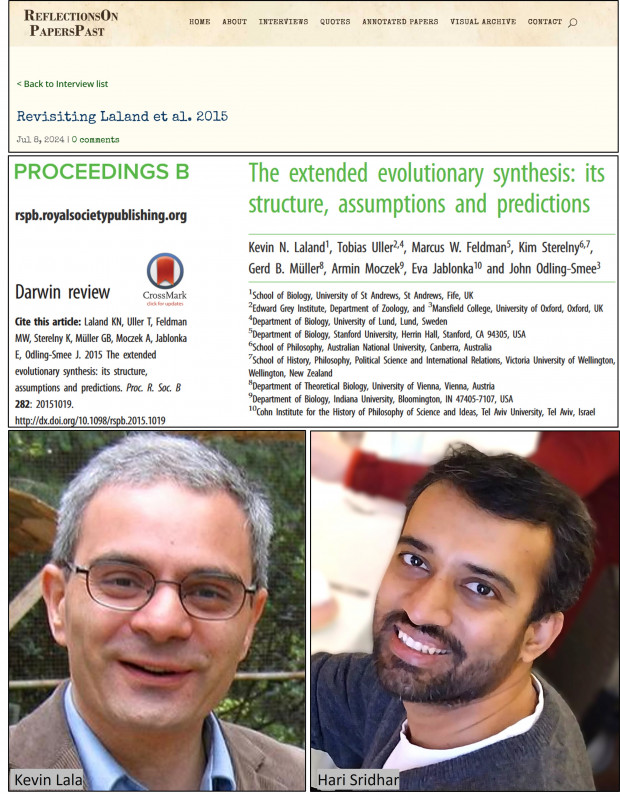News Details

What lies behind the making of a scientific paper that challenges the very foundations of a field? In a candid interview with Hari Sridhar, Kevin Lala tells the back story of one such paper "The extended evolutionary synthesis: its structure, assumptions and predictions" published in the Proceedings of the Royal Society B in 2015, and reflects on the paper's influence today, nearly 10 years after it was published. Read this interview on the Reflections on Papers Past website, which is a treasure trove of fantastic conversations with authors of well-known and influential papers in the field of Ecology and Evolution.
The Extended Evolutionary Synthesis has created ripples in the world of evolutionary biology over the last 10 years, motivating debate and disagreement as well as a large body of new research. In the fall-winter of 2024, a new book titled Evolution Evolving: The Developmental Origins of Adaptive Diversity by Kevin N. Lala, Tobias Uller, Nathalie Feiner, Marcus Feldman, and Scott F. Gilbert will be launched that attempts to bring this body of research and the ideas of EES together in an accessible manner.
The idea of EES however was conceived in 2008, nearly a decade and half ago, at a meeting held at the old Konrad Lorenz Institute in Altenberg. Over the next few yeas a small group of biologists and philosophers came together to attempt to give the EES shape and substance. A key paper that laid out their vision for an “Extended Evolutionary Synthesis” (EES) was published in Proceedings of the Royal Society B in 2015 (The extended evolutionary synthesis: its structure, assumptions and predictions) by authors Kevin Lala, Tobias Uller, Marcus Feldman, Kim Sterelny, Gerd Müller, Armin Moczek, Eva Jablonka and John Odling-Smee. Lala and colleagues argued that standard evolutionary theory was too narrowly focussed on genetic inheritance and that new findings in evo-devo, developmental plasticity, inclusive inheritance and niche construction demanded a recognition of processes through which organisms grow and develop as causes of evolution.
Almost 10 years after the Proceedings paper was published, in an interview with KLI fellows Hari Sridhar, lead author Kevin Lala (formerly Kevin Laland) candidly spoke about the backstory to the paper, and more generally about the origins and current status of the EES. The story of this journey, no less thrilling than an adventure novel, has drama, twists and turns, inspiring courage and determination, all of which began on a fine summer afternoon under a tree at the KLI with a glass of wine nearly 15 years ago.
Read this interview on the Reflections on Papers Past website, which is a treasure trove of fantastic conversations with authors of well-known and influential papers in the field of Ecology and Evolution.
Here is an excerpt from Hari's interview with Kevin:
Hari Sridhar: It’s fitting that this interview is happening at the KLI, because the origins of these papers trace their way back to a meeting that happened, not in this building, but in the old KLI. Maybe we can start by talking a little bit about that meeting.
Kevin Lala: Yeah, well, I wasn’t actually at that meeting. But I do have a good visual memory of the first time I heard the label Extended Evolutionary Synthesis. It was because my colleague, John Odling-Smee, had been invited to that particular meeting. He and I, of course, had been working on niche construction theory with Marc Feldman. I remember being in John’s dining room – I suppose this must have been 2008, something like that – and he told me that he’d been invited to this KLI workshop on the Extended Evolutionary Synthesis. And I remember saying to him, “what’s that?” He replied words to the effect that he didn’t know, but, you know, there were a lot of interesting people going to the workshop, and he thought it would be fun, so he was gonna go anyway. And I remember saying to him, "when you get back, let me know how it goes and what that Extended Evolutionary Synthesis is".
Kevin Lala is Professor of Behavioural and Evolutionary Biology at the University of St. Andrews (Scotland), and also serves as an External Faculty of the KLI. He has held positions at UCL, UC Berkeley and Cambridge Universities. He studies animal behaviour and evolution, with a specific focus on niche construction, the Extended Evolutionary Synthesis, and the evolution of cognition.
Interview: Revisiting Laland et al 2015
Date and place of interview: 7 June 2024; Konrad Lorenz Institute for Evolution and Cognition Research (KLI), Klosterneuburg, Austria.
Credits: Hari Sridhar (background research, planning and conducting interview); Joyshree Chanam (background research, planning and editing of interview)

